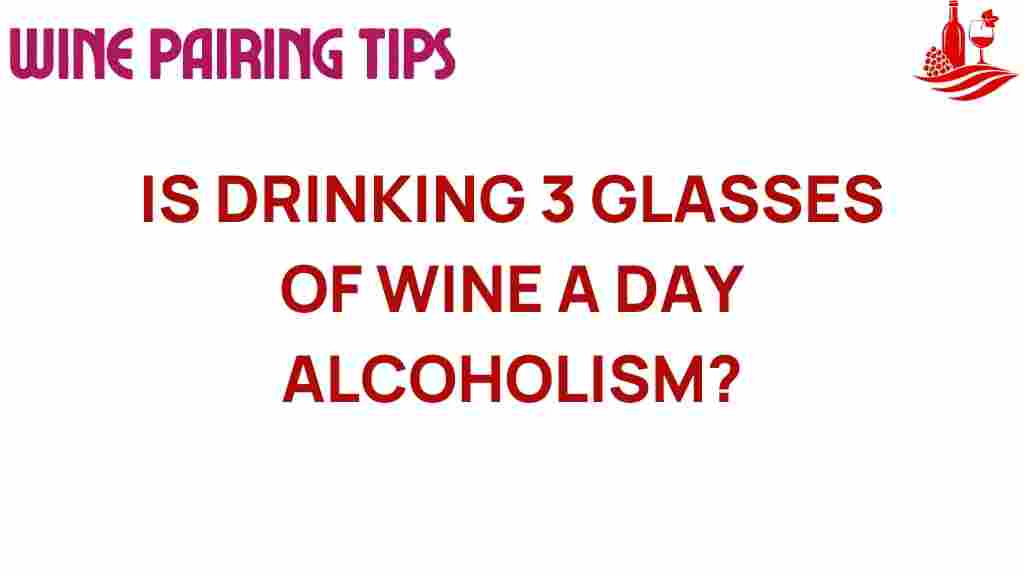Unpacking the Myths: Is Drinking 3 Glasses of Wine Daily Alcoholism?
In recent years, discussions surrounding alcohol consumption have become increasingly complex. The rise of the wine culture has led many to question whether drinking three glasses of wine daily constitutes alcoholism or if it can fit into a healthy lifestyle. As we delve deeper into this topic, we will unpack the myths and explore the nuances of wine health effects, moderation, and the fine line between enjoyment and addiction.
Understanding Alcohol Consumption
Before we can address whether three glasses of wine daily is considered alcoholism, it’s essential to understand what alcohol consumption entails. The term refers to the intake of alcoholic beverages, which can vary widely in type, volume, and frequency. For many, social drinking is a normative behavior, often associated with celebrations, gatherings, or simply winding down after a long day.
The Role of Wine in Daily Drinking
Wine is often perceived as a sophisticated choice of beverage, and many individuals integrate it into their daily routines. Drinking wine can be seen as part of a wine lifestyle that emphasizes enjoyment and moderation. However, it’s crucial to define what is meant by “moderation” in the context of daily drinking.
- Moderate drinking is typically defined by health authorities as up to one glass of wine per day for women and up to two glasses for men.
- Exceeding these limits on a consistent basis may raise concerns regarding potential health risks and the possibility of developing an addiction.
Wine Health Effects: The Good and the Bad
When discussing wine health effects, it is vital to highlight both the positive and negative aspects associated with alcohol consumption. Research has shown that moderate wine consumption may have certain health benefits, including:
- Improved cardiovascular health due to antioxidants found in red wine.
- Potentially lower risk of type 2 diabetes.
- Social benefits related to bonding and relaxation.
However, it’s essential to balance these benefits with the associated health risks of drinking three glasses of wine daily:
- Increased likelihood of developing alcohol dependence.
- Negative impact on mental health, including anxiety and depression.
- Potential liver damage and other long-term health complications.
Defining Alcoholism and Addiction
To determine whether drinking three glasses of wine daily could be classified as alcoholism, it is crucial to understand the criteria that define alcohol use disorder (AUD). The Diagnostic and Statistical Manual of Mental Disorders (DSM-5) outlines several criteria for AUD, including:
- Consuming alcohol in larger amounts or for a longer period than intended.
- Unsuccessful efforts to cut down or control alcohol use.
- Spending a significant amount of time obtaining, using, or recovering from alcohol.
- Experiencing cravings or a strong desire to use alcohol.
If drinking three glasses of wine daily leads to the fulfillment of any of these criteria, it may indicate an unhealthy relationship with alcohol.
The Importance of Moderation
Moderation plays a critical role in healthy alcohol consumption. It’s essential to recognize that everyone’s tolerance and reactions to alcohol can vary significantly. What might be moderate for one person could be excessive for another. Here are some tips for ensuring moderation in your drinking habits:
- Track your consumption: Keeping a journal can help you stay aware of how much you drink.
- Set limits: Decide in advance how many days a week you will drink and how much.
- Choose alcohol-free days: Designate certain days of the week as alcohol-free to break the routine.
Social Drinking and Its Implications
Social drinking often normalizes the consumption of alcohol, making it more challenging to recognize when drinking has crossed the line into problematic behavior. In many cultures, drinking wine is associated with social events and gatherings, adding a layer of complexity to the discussion of alcohol use. Here are some aspects to consider:
The Social Context of Drinking
Understanding the social context of drinking is vital in assessing its impact on health. Peer pressure, social norms, and cultural expectations can all influence how much we drink. In social settings, drinking may be encouraged or even expected, which can lead to:
- Increased consumption beyond personal limits.
- Difficulty recognizing personal drinking patterns.
- Normalizing excessive drinking behaviors.
Alcohol Awareness and Education
Raising alcohol awareness is essential for fostering healthier drinking habits. Education about the effects of alcohol, understanding addiction, and recognizing the signs of alcohol use disorder can empower individuals to make informed choices. Here are effective strategies for promoting alcohol awareness:
- Participate in educational programs about alcohol consumption.
- Engage in open conversations about drinking habits with friends and family.
- Utilize resources like [the National Institute on Alcohol Abuse and Alcoholism](https://www.niaaa.nih.gov/) for information and support.
Recognizing When to Seek Help
If you or someone you know is struggling with daily drinking, it’s crucial to recognize the signs and seek help. Resources are available, and there is no shame in reaching out for support. Consider these steps:
- Consult a healthcare professional for guidance.
- Join support groups such as Alcoholics Anonymous.
- Engage in therapy to address underlying issues contributing to alcohol use.
Conclusion: Finding Balance in Wine Consumption
In conclusion, drinking three glasses of wine daily can straddle the line between moderation and potential addiction. It is essential to be mindful of your drinking habits and assess whether they align with a healthy lifestyle. Understanding the wine health effects, recognizing when drinking becomes problematic, and promoting alcohol awareness are crucial steps in navigating the complexities of alcohol consumption.
Ultimately, the key to enjoying wine responsibly is to prioritize moderation and be aware of the risks associated with daily drinking. By fostering a balanced approach to alcohol, individuals can enjoy their wine lifestyle without compromising their health and well-being.
For more information on alcohol consumption and its implications, consider exploring this resource that provides valuable insights and support.
This article is in the category Tips and created by Wine Pairing Tips Team
